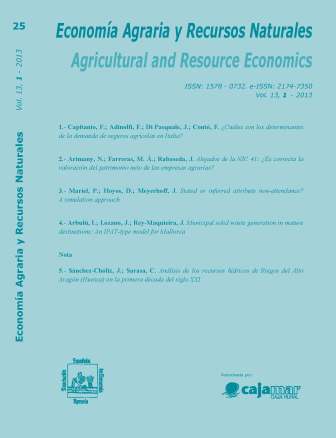Stated or inferred attribute non-attendance? A simulation approach
DOI:
https://doi.org/10.7201/earn.2013.01.03Palabras clave:
Attribute non-attendance, choice modelling, environmental valuation, random parameter logit.Resumen
In the last few years, there has been a growing body of literature on how to detect and deal with the fact that some respondents seem to ignore one or more attributes in a discrete choice experiments.This paper aims to analyse the performance of two econometric approaches devoted to solve this problem: the stated attribute non-attendance approach and the inferred attribute non-attendance approach. These approaches are examined further by two common ways of collecting information on attribute non-attendance: serial and choice task non-attendance. The results of the simulation experiments show firstly, that choice task non-attendance of one attribute causes biases in the estimation of all other parameters; and, secondly, that only serial non-attendance can be inferred successfully. The results are policy relevant because not treating, or treating this issue incorrectly may end up in biased welfare measures.
Descargas
Publicado
2013-06-07
Número
Sección
Artículos

